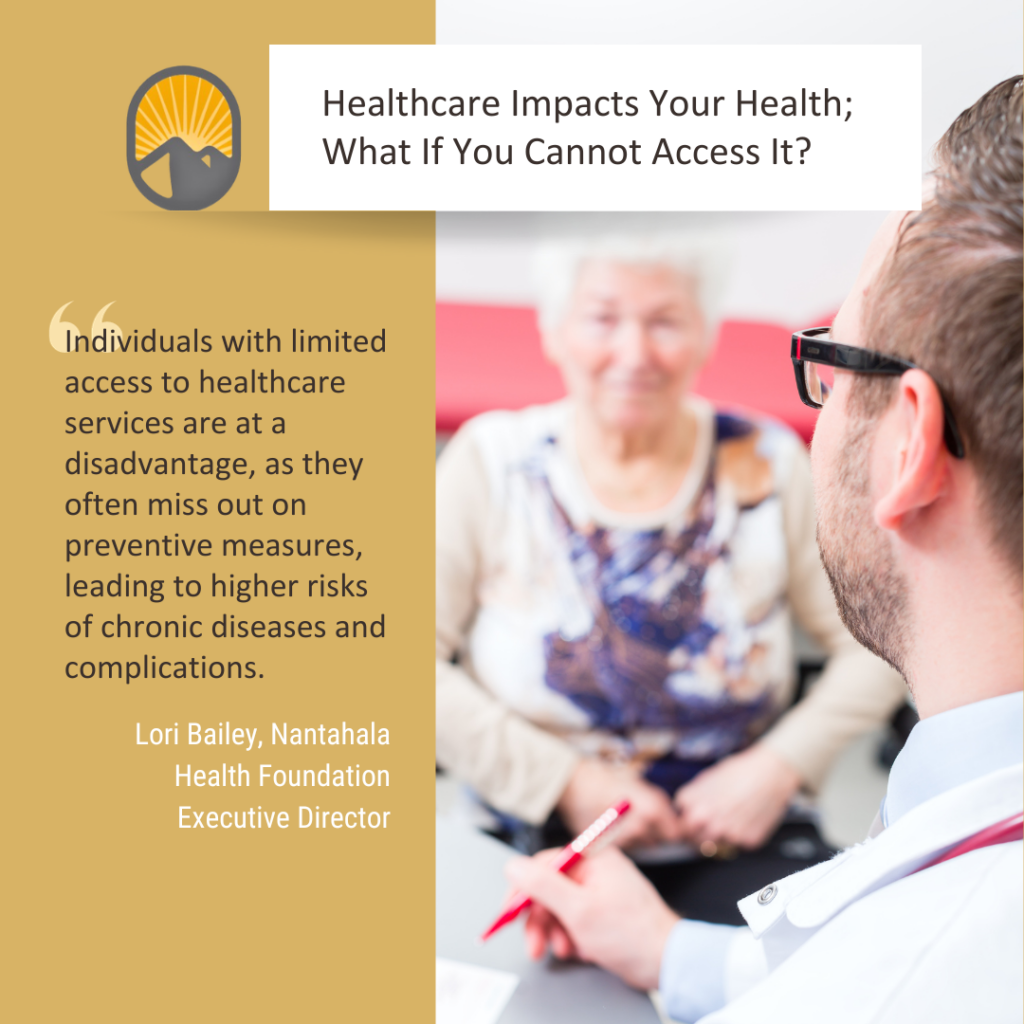This is the fourth in a five-part series being published in newspapers throughout Western North Carolina. Our aim with this series is to expand the public’s understanding of social drivers of health and the struggles individuals face when they are unable to modify these factors.
We are grateful for the media’s support and for helping us share this informational series.

Considering the vast array of health drivers individuals face daily, interacting with clinicians should be the most important step to take to ensure healthy outcomes, right?
“Would you be surprised to learn that time spent face to face with your healthcare provider impacts only about 20 percent of health outcomes over your lifetime?” said Nantahala Health Foundation Executive Director Lori Bailey. “Even so, spending a lifetime without access to quality healthcare would be akin to asking someone to win a marathon after sitting through a 2-hour delay.”
Access to healthcare plays an important role in shaping individual well-being and influencing health outcomes from cradle to grave. That’s why, Bailey said, it was important for Nantahala Health Foundation to invest in Blue Ridge Health’s work to care for expectant mothers in Jackson County with no health insurance. Access to care encompasses not just availability, but affordability, quality of medical services and supplemental resources, which collectively determine the extent to which individuals are empowered to address and manage their health needs.
Access to healthcare is essential for learning and implementing preventive measures and early intervention, said Bailey.
“Timely medical screenings, vaccinations, and health check-ups are crucial in detecting and addressing potential health issues before they escalate into more severe conditions. Individuals with limited access to healthcare services are at a disadvantage, as they often miss out on these preventive measures, leading to higher risks of chronic diseases and complications.
“Furthermore, access to healthcare is closely linked to health equity. Disparities in access disproportionately affect rural, marginalized and underserved populations, exacerbating existing health inequalities. Lack of access can lead to delayed or inadequate care, resulting in poorer health outcomes for vulnerable communities,” she continued.
Effective management of chronic conditions relies heavily on consistent access to healthcare services. Regular medical visits, prescription medications, and specialized treatments are vital for individuals with ongoing health issues. Limited access can disrupt the continuity of care, causing individuals to miss essential treatments and leading to worsening health conditions.
“Mental health is another critical aspect affected by access to healthcare. Adequate mental health services, including therapy and counseling, are necessary for addressing conditions such as anxiety, depression, and stress,” said Bailey. “Limited access can contribute to untreated mental health issues, negatively impacting overall well-being and potentially leading to a cascade of physical health problems.”
Moreover, the financial burden associated with healthcare can influence health outcomes. High healthcare costs can deter individuals from seeking necessary medical attention, leading to delayed diagnosis and treatment. Financial strain from medical expenses can also contribute to stress and negatively impact mental health.
Access to healthcare is, without a doubt, a fundamental social driver of health, exerting far-reaching impacts on individuals and communities, Bailey said.
“Timely and affordable access to medical services is essential for preventive care, chronic disease management, mental health support, and health equity,” she said. “In Nantahala Health Foundation’s work to remove barriers to healthcare access, our goal is to achieve better health outcomes and promote overall well-being for every man, woman and child living in the WNC region.”
